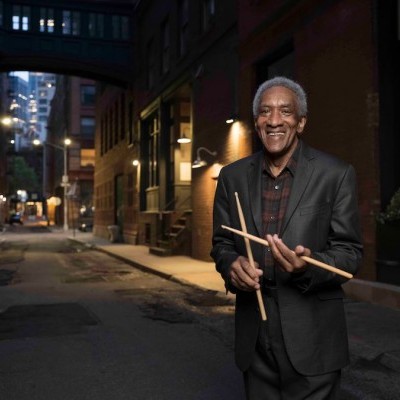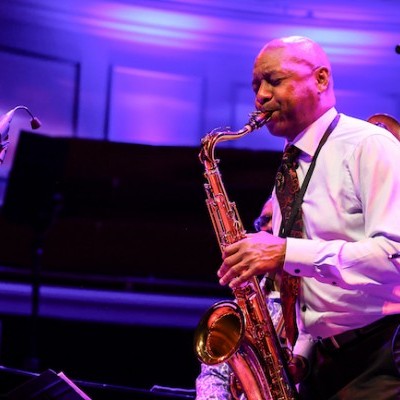Jun 3, 2025 11:25 AM
In Memoriam: Al Foster, 1943–2025
Al Foster, a drummer regarded for his fluency across the bebop, post-bop and funk/fusion lineages of jazz, died May 28…

Dee Alexander explores the more obscure songs of Billie Holiday on her latest Delmark release.
(Photo: Mark Sheldon)“I can’t remember a time when Billie Holiday’s music wasn’t in my life,” says Dee Alexander, the Chicago singer who collaborates with the Metropolitan Jazz Octet on It’s Too Hot For Words: Celebrating Billie Holiday (Delmark). “As a child, my mother played her records, and I awakened to Billie Holiday many mornings.”
Alexander, locally renown for decades of performances in an ever-expanding array of contexts, and heard as a host on the syndicated WFMT Radio Network, shared a story about waking up as a child and going to find her mother. “I came into the kitchen in my little onesie, rubbing my eyes and asking, ‘Why was that lady cryning?’—I said ‘cryning,’ not ‘crying’—about her man? What did he do to her?’” The lyric was from Holiday’s blues “Fine And Mellow”: “My man don’t love me/ He treats me awful mean.”
“We all know Billie suffered that,” Alexander acknowledges, but Lady Day’s famous songs of mistreatment and despair aren’t among the 10 tracks she and MJO tenor saxophonist and co-leader Jim Gailloreto chose to interpret anew. “I wanted to sing positive lyrics, like ‘Things Are Looking Up,’” she says. And indeed, It’s Too Hot For Words reforms the Holiday narrative by focusing on the vocalist’s self-assertions, romantic yearnings and simple joys.
“I was on the hunt for more obscure music by Billie,” explains Alexander, who came up in the 1970s working with rock and r&b bands, advanced to on-the-job training with members of the AACM and spent 10 years in the late pianist Ken Chaney’s soulful Xperience. Since then, she’s become a leader in her own right and a sought-after collaborator. “I wanted songs that people weren’t so familiar with, keeping in mind at the same time that people want to hear songs by Billie they are familiar with.”
So, while “Strange Fruit,” with its horrific description of a lynching, is a central track, arranged for the octet’s five horns and rhythm section, plus a string sextet to showcase Alexander’s unflinching power, the album starts with a rousing “Ain’t Nobody’s Business If I Do,” then turns to other upbeat and optimistic connections. The finale is an optimistic, Depression-era ditty in which Alexander avows, “My heart keeps singing I love you/ 24 hours a day.”
The octet veers between intimate chamber group sounds and bold little-big-band statements. Throughout, Alexander exudes warmth, conviction, rhythmic certainty, precise diction and hard-earned effortlessness. Her tonality is pure, rich and comforting, especially in her low and middle ranges. “I want you to feel like you’re in your soft, fuzzy robe when you’re listening to me, like you just came out of the shower or out of the bath and are cozy,” she says. “I’m always trying for the honey in my voice.”
“Dee is able to pull off just about anything you ask of her,” says Gailloreto, who was wowed by Alexander upon first exposure in late 2017, and hopes Too Hot For Words is just the beginning of their association. “She can scat, sing at a whisper, or can make you cry. We did a lot of test recordings with her and a piano, so the arrangers could get a sense of the emotions she was going for, and it was pretty easy to write after that. We’d learn what the song was about for her, just based on her voice, and do a treatment. She’s also fearless, totally willing to go in directions that are unique to the situation.” An example is Alexander’s surprise shift from montuno to swing at the peak of “Too Hot For Words.”
Considering there’s other Holiday repertoire suited for similar Dee Alexander-MJO attention, might there be a volume two? “It’s a strong possibility,” the singer says. “But I’m also focused on a special project of original material with John McLean, the guitarist. Because I have my own story to tell.” DB

Foster was truly a drummer to the stars, including Miles Davis, Sonny Rollins and Joe Henderson.
Jun 3, 2025 11:25 AM
Al Foster, a drummer regarded for his fluency across the bebop, post-bop and funk/fusion lineages of jazz, died May 28…

“Branford’s playing has steadily improved,” says younger brother Wynton Marsalis. “He’s just gotten more and more serious.”
May 20, 2025 11:58 AM
Branford Marsalis was on the road again. Coffee cup in hand, the saxophonist — sporting a gray hoodie and a look of…

“What did I want more of when I was this age?” Sasha Berliner asks when she’s in her teaching mode.
May 13, 2025 12:39 PM
Part of the jazz vibraphone conversation since her late teens, Sasha Berliner has long come across as a fully formed…

Roscoe Mitchell will receive a Lifetime Achievement award at this year’s Vision Festival.
May 27, 2025 6:21 PM
Arts for Art has announced the full lineup for the 2025 Vision Festival, which will run June 2–7 at Roulette…

Benny Benack III and his quartet took the Midwest Jazz Collective’s route for a test run this spring.
Jun 3, 2025 10:31 AM
The time and labor required to tour is, for many musicians, daunting at best and prohibitive at worst. It’s hardly…